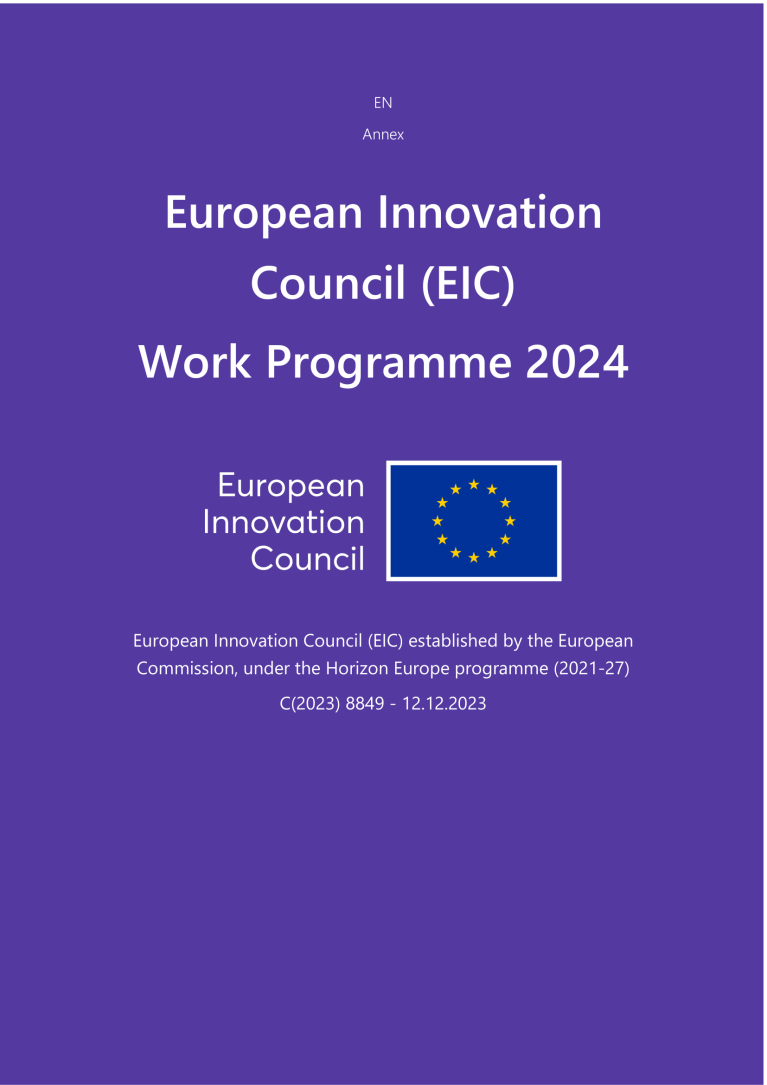2024 Challenges
The EIC Accelerator Challenges calls are open to proposals in predefined topics that have been identified in areas where breakthrough technologies or game-changing innovations developed by start-ups or SMEs can have a major impact on EU objectives.
Is your project dealing with a different topic?

- General publications
- 12 December 2023
The European Innovation Council work programme 2024 opens funding opportunities worth over €1.2 billion for strategic technologies and scaling up companies. The majority is dedicated to SMEs and start-ups to develop and scale up “deep tech” innovations in critical fields such as generative artificial intelligence (AI), space, critical raw materials, semiconductors and quantum technologies.
Human Centric Generative AI made in Europe
Indicative Budget: EUR 50 million
To foster a human-centric approach to AI and develop models that embody EU values.
The aim of this Challenge is to foster a European, human-centric approach to AI, tackling prevalent issues like transparency deficit and trust inadequacy. European AI start-ups have the potential to develop the next generation of generative AI models that embody EU values and guarantee Europe’s sovereignty in this critical field.
See work programme page 79
Enabling virtual worlds and augmented interaction in high-impact applications to support the realisation of Industry 5.0
Indicative Budget: EUR 50 million
To enable the use of high fidelity virtual worlds in high-impact markets and applications promoting Industry 5.0 principles of sustainability, human-centric, and resilience by scaling up cutting-edge innovations for platforms, middleware, tools, and devices.
The specific objective of the Challenge is to support the development and deployment of advanced virtual worlds technology solutions for industry which are human centric, sustainable, and resilient in their design and/or user contexts.
See work programme page 82
Enabling the smart edge and quantum technology components
Indicative Budget: EUR 50 million
To promote the development of novel semiconductor components and integrated smart systems for next-generation edge devices with significant impact.
The objective of this Challenge is to promote the development of novel semiconductor components and integrated smart systems for next-generation edge devices with significant impact. The proposals should focus on development of smart integrated devices where the competitive advantage may lie in the system approach or in one of the key components or technologies.
See work programme page 84
Food from precision fermentation and algae
Indicative Budget: EUR 50 million
To support the production of food from precision fermentation and algae that decouples food production from the soil and environmental conditions.
In support of the EU Soil Mission, the EU Green Deal, Farm to Fork strategy, Fit for 55 and REPowerEU policy actions, the key goal of this Challenge is to support the production of sustainable and nutritious food from precision fermentation and algae. Innovations must go beyond incremental changes to the state of the art and deliver novel production processes that must deliver energy and resource efficient, low emission foods that are integral to a healthy diet.
See work programme page 90
Monoclonal antibody-based therapeutics for new variants of emerging viruses
Indicative Budget: EUR 50 million
To support the development of strategic approaches leading to broad spectrum mAbs-based therapeutics against new variants of emerging pathogens of high concern.
This Challenge aims to enhance the EU’s response to future pandemics. It will provide solutions that can complement efforts to deliver rapid detection and analysis of virus variants, in coordination with relevant international systems and networks (such as the HERA incubator) and will ensure that the development of new antiviral treatments target the variants of highest concern. It will also help develop a platform of approaches that can ensure efficacy of future treatment in the event that new variants of high concern exhibit decreased susceptibility to current mAbs.
See work programme page 92
Renewable energy sources and their whole value chain
Indicative Budget: EUR 50 million
To scale-up different RES and their supply chain to limit the EU’s significant dependency on imports of components including critical raw materials.
This challenge aims at scaling-up different RES and their supply chain to limit the EU’s significant dependency on imports of components including CRM to ultimately increase the EU’s energy strategic autonomy in the energy sector. This challenge contributes to the objectives of both Net-zero industry and Critical raw materials acts and to the EU’s open strategic autonomy.
See work programme page 93
